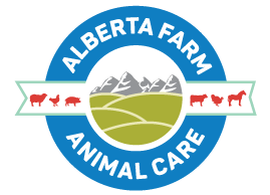Tips to Overwinter Cattle
By Kendra Juurlink, B.Sc. (Agr), Alberta Farm Animal Care (AFAC)
Overwintering cattle can be challenging for producers in Canada due to the climate. Especially with the concern of feed shortages during the winter months. Therefore, it is recommended that producers plan for potential feed shortages as best they can.
Research is being done across Canada that examines efficient crop management strategies. With the goal to ensure adequate growth of cattle over the winter and to minimize the economic impacts of feed shortages on the producer.
It is important that producers ensure that their cattle have adequate nutrients based on the stage of production. Some solutions to use feed more efficiently include grinding, using feed bunks to reduce waste, proper feed storage to reduce loss, and balancing nutrition for cattle.
In a recent Canadian Cattlemen’s article, Dr. Hushton Block was quoted saying “using a feed bunk instead of feeding on the ground can reduce feed waste from 25 per cent or higher to as low as 10 per cent”-
It is recommended that producers routinely sample and analyze the nutritional value of their feed to ensure proper nutrition for their cattle. Protein is an important component in the diet that must meet both the rumen microbe’s and animal’s needs.
The rumen of the animal is important in the breakdown of protein. When the animal has low levels of rumen-degradable protein (e.g., soybean, alfalfa), it results in decreased energy and microbial protein that the animal receives from the rumen microbes. This can impact the health and performance of the animal.
Another factor for ensuring enough feed is crop selection. Winter cereal crops (e.g., rye, wheat) have been shown as a viable option for forage in winter. Another recommendation is that producers secure alternate feed or additional feed supplies at a reasonable price. Having animals in good condition prior to the onset of winter can also reduce feed requirements.
Overwintering is an important component of livestock production. Producers can alleviate stress by planning ahead using various suggestions as outlined in this article. These suggestions can benefit the producer economically and optimize performance of their cattle during the colder months.
